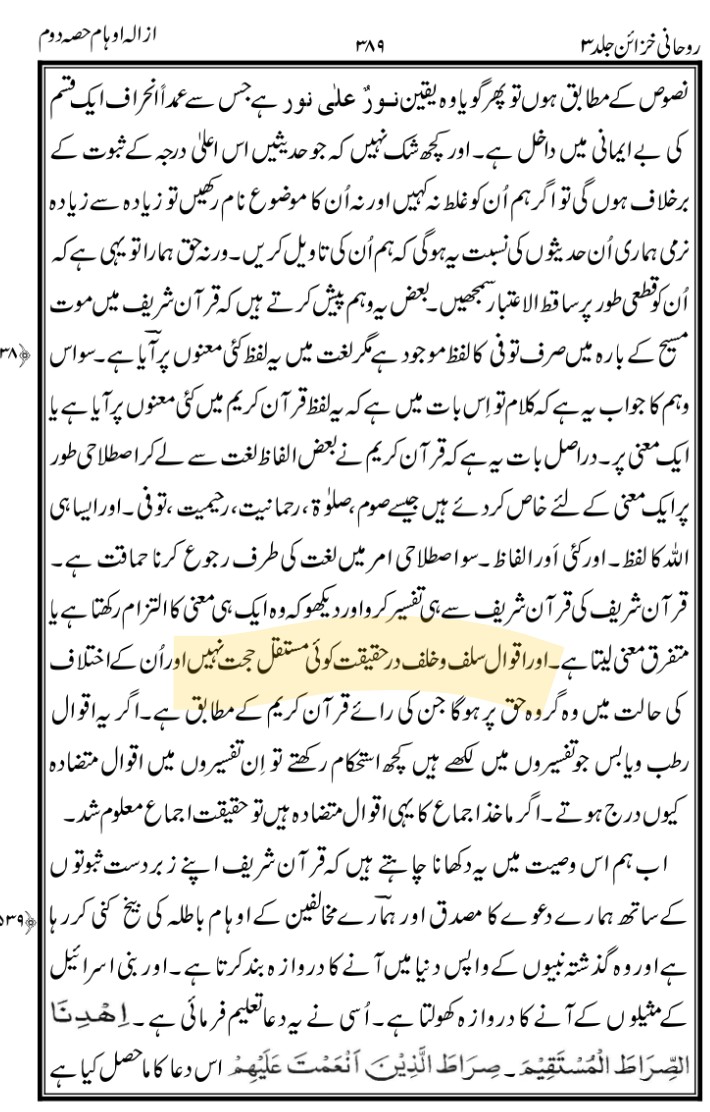Qadianis Deceive by Presenting Partial Statements
Qadianis often present selected excerpts from the sayings of classical scholars, intentionally omitting the context to mislead others. Whenever Qadianis quote a scholar, keep the following foundational points in mind, and their deceit will become evident:
Fundamental Points to Keep in Mind
- The first point is this: When Qadianis themselves do not consider the statements of earlier scholars as binding proof, why do they present these statements at all?
Mirza Ghulam Ahmad wrote:
“The statements of the Salaf and Khalaf (past and recent scholars) are not, in fact, a binding proof.”
— Izala-e-Auham, Part 2, p. 538 | Ruhani Khazain, vol. 3, p. 389

- Mirza Ghulam Ahmad’s son, Mirza Mahmood, admitted:
“The definition of prophethood according to which you (Mirza Ghulam Ahmad) denied your own prophethood was: A prophet is someone who brings a new Shariah, or abrogates part of the previous one, or receives revelation directly without being a follower of another prophet. This definition was universally accepted among Muslims.”
— Haqiqat-un-Nubuwwah, p. 122
This clearly proves that even Qadianis accept that until the time of Mirza Ghulam Ahmad, the entire Muslim Ummah believed that no new prophet can come after the Prophet Muhammad ﷺ.
Introductory Principles
- Anyone who brings a new Shariah cannot be a prophet.
- Even Qadianis admit that Muslims have always had one clear understanding of the finality of prophethood.
- We claim with certainty that not a single scholar in Islamic history believed that a new prophet could come after the Prophet Muhammad ﷺ.
- Qadianis can never present a single statement from any scholar that fulfills all four of the following conditions:
- The statement must not mention the return of Isa (Jesus) عليه السلام.
- The statement must explicitly mention the coming of a non-legislative prophet in this Ummah after the Prophet ﷺ.
- It should mention actual prophethood, not just dreams or spiritual insights.
- The statement should not be in the context of rank or excellence (i.e., metaphorical prophethood), but be presented falsely by Qadianis as time-based finality.
The Intellectual Dishonesty of Qadianis
The statements Qadianis quote are always filled with conditions and qualifications — like “if”, “but”, “because”, “thus”, etc.
In matters of creed, only explicit and clear textual evidence (Nass-e-Sarih) is acceptable.
Relying on such conditional or ambiguous statements is a form of deceptive misinterpretation, not honest scholarship.
Qadiani Misuse of Shaykh Ibn Arabi’s Statement
Qadianis present the following statement from Shaykh Ibn Arabi:
“The door to legislative prophethood is closed. The meaning of the Prophet’s ﷺ saying ‘there is no prophet or messenger after me’ is that there will be no prophet who opposes my Shariah. If anyone comes, he will be under my Shariah.”
— Al-Futuhat al-Makkiyyah, vol. 2, p. 3
The Contradiction of the Qadianis
Even Mirza Ghulam Ahmad himself had harsh words for Shaykh Ibn Arabi:
“Shaykh Ibn Arabi was among the ‘Wujoodi’ (pantheists).”
— Malfuzat, vol. 2, p. 232
“There is little difference between pantheists and atheists. These Wujoodis (like Shaykh Ibn Arabi) are extremely despicable and repugnant.”
— Malfuzat, vol. 4, p. 397
If Mirza Ghulam Ahmad himself considered Ibn Arabi misguided, how can Qadianis use his statements as religious proof?
Refutations of Qadiani Misuse
✅ Reply 1: Revelation Specific to Prophets Has Ended
“The type of revelation specific to prophets and messengers — where angels would descend upon their hearts or ears — has ended. It is now forbidden to call anyone a prophet or messenger.”
— Al-Futuhat al-Makkiyyah, vol. 2, p. 253
This shows that Ibn Arabi firmly believed prophetic revelation had ceased forever.
✅ Reply 2: Even Jesus (as) Will Not Receive Prophetic Revelation
“Revelation ended with the death of the Prophet ﷺ… When Jesus (as) leads this Ummah, he will follow our Shariah. He will only have access to spiritual unveilings and inspirations, just like the saints (awliya) of this Ummah.”
— Al-Futuhat al-Makkiyyah, vol. 3, p. 238
This confirms that even Prophet Isa (as) will not receive prophetic revelation upon his return — he will only have saintly insights like other awliya.
✅ Reply 3: Use of “Prophethood” in a Metaphorical Sense
“This kind of prophethood also occurs among animals, as Allah says: ‘And your Lord inspired the bee…’”
— Al-Futuhat al-Makkiyyah, vol. 2, p. 254
Ibn Arabi used the term “prophethood” metaphorically for divine inspirations, even among animals — clearly proving that such language does not refer to actual prophethood.
Conclusion
✅ Shaykh Ibn Arabi’s belief is crystal clear:
- The Prophet Muhammad ﷺ is the final prophet.
- No kind of prophethood or messengership can occur after him.
- Anyone claiming otherwise is outside the fold of Islam.
- Wherever Ibn Arabi uses the word “prophethood”, it is metaphorical, not literal — just like the hadith that says:
“Nothing remains of prophethood except good dreams (mubashirat).”